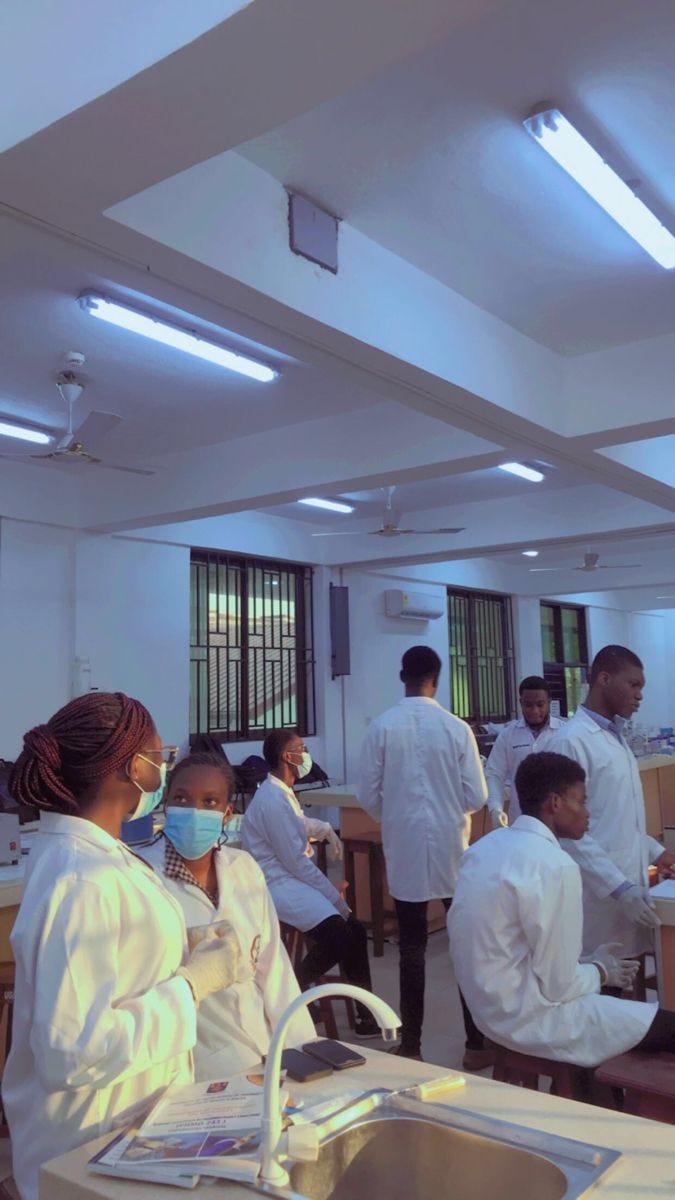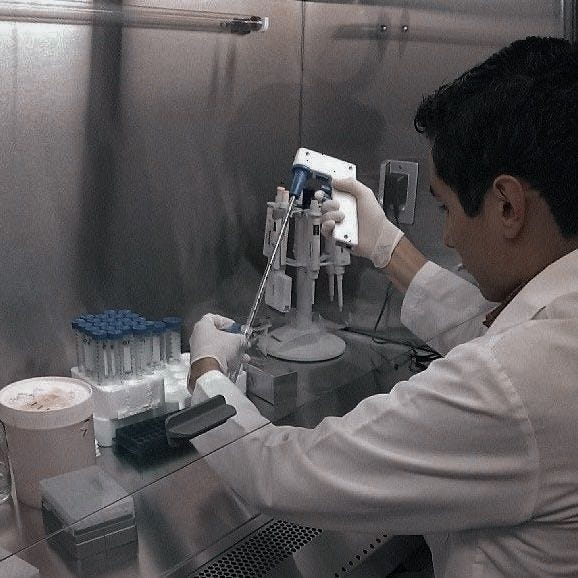Aim:
To gain an insight on the state of accredited centres that provide internship for medical laboratory scientists.
Given: Medical Laboratory Science (MLS), Internship, Accreditation, Standardization, Regulations, Challenges
Method:
Expository Essay
Principle:
To be a “plant-mum” is relatively easy. You simply need to buy a plant, get a bowl to house the plant, put the plant in a place where it gets direct sunlight, and keep watering it everyday. By doing so, you create a healthier, stronger, and thriving plant. What then happens if you own a plant, set it up in a dark room, and neither water nor nourish it? In no time, the plant would invariably wilt, and maybe, even die. That’s the school of thought for nurturing ideas like the Medical laboratory science graduate internship.

Procedure:
The medical laboratory science graduate internship is a professional learning experience that offers clinical work- experience for every young medical laboratory science graduate. According to the Medical Laboratory Science Council of Nigeria, every graduate of the profession has to undergo this period of internship at an accredited centre. There are currently about 117 accredited centres including private hospitals and independent laboratories across the country.
Think of young MLS graduates as plants, while the internship experience is the bowl, nourishment, and sunlight needed for growth. Getting good nourishment for a thriving plant should not be difficult, right?
Wrong!
For many, the process of getting an internship placement is bittersweet. On the one hand, it means finally going to do what you’ve always loved on a much larger scale, and on the other? There’s a dread attached to the search.
The dread of not getting “good nutrients” has now even solidified the belief that “to get internship no be beans o”.
As a plant mum, you typically put one plant, or two plants at most, into one bowl. This is to ensure that each plant can get maximal nutrients from its surroundings.
What happens when there are 20 plants waiting to get into one bowl? What happens when the plant mum refuses to cater for her plants? What happens when she refuses to create newer bowls when her plants increase in number?
This dilemma seems to be the state of accredited centres in Nigeria. What are some of these common realities?

According to Nigeria’s law, only the Medical Laboratory Science Council of Nigeria (MLSCN) is empowered to certify and accredit new centres to take in MLS graduates. The MLSCN- the plant mum - is the only one with the power to determine which bowl - internship centre - is fitting and qualified to help plants grow.
However, one of the unfortunate realities of the internship programme is that of the 117 accredited centres, quite a chunk of them do not accept MLS graduate interns anymore. This is ironic as thousands of new MLS graduates get churned out by universities annually - with little or no space available for their internship. In some centres, 200 people compete for a vacancy of 12!
This is similar to 200 plants trying to get into a bowl/space meant for 12. How effective can that be?
There is always a backlog of Medical Laboratory Science graduates waiting to get accepted into the internship program. Some people wait for as long as five years, and even as you read this, someone somewhere is still waiting. But for how much longer?

As a plant mum, imagine you keep some of your plants directly under sunlight and you water them regularly. While you keep some under sunlight, but no water. And others, no sunlight and no water. Would they grow uniformly? Most likely not.
The absence of uniformity within the MLS internship programme is another stark reality. In the past, the quality of training received by every medical laboratory scientist was similar, if not the same. However, over the years, there have been inconsistencies in the quality of the training offered by various internship centres. This inconsistency across centres has resulted in skewed quality of graduates - with some having hands-on experience in some specialities, and others, having neither knowledge nor hands-on experience. It is such a rude awakening, knowing that some accredited centres do not allow graduates to rotate through all 4 specialties of medical laboratory science, with some only rotating through 2 specialties at the most.
Also, there seems to be no standard curriculum for accredited centres to follow while training interns. Centre A might operate a four-lab system while centre B only operates a three-lab system. This might mean that while an intern might enjoy the opportunity to gain experiences in specialised fields like molecular biology, virology or even soft skills, some other counterparts don’t. Our accredited centres lack uniformity and standardisation - which invariably affects the quality of scientists produced.
“To get internship no be beans o”.

NOW WHAT?
In light of these realities, what can be done to improve the state of our accredited centres?
Accredit newer centres.
When a plant mum sees that she has more plants than her bowl, she doesn’t fold her hands and watch. She brings more bowls out and ensures that each plant has a place to stay, thrive, and grow. As the plant mum in this situation, there is a need for the Medical Laboratory Council of Nigeria, MLSCN, to increase exponentially its effort in the standardisation of our profession beginning with the accreditation of newer centres for the internship program. Standards for accreditation should also be duly reviewed to align with current trends in the field of Medicine.
Monitor and evaluate
A plant mum typically spends her time looking over her plants and seeing which ones are thriving, and which ones need to be worked on. With a scheme as important as the graduate internship, it is imperative that adequate monitoring is done to the hosting centres - to identify if they are still taking interns, if they are still qualified enough to accept interns, and if newer centres are needed to open up. A thorough monitoring and regular evaluation of these centres is needed.
Standardisation
The internship year is intended in its entirety to help gain practical experience - but some centres are not fit to give these experiences. The reality is that while a few have top-notch techniques and machinery, other institutions are outdated. While this doesn’t translate to poor quality of laboratory services, it does mean that interns and intending scientists are stuck in the cycle without the kind of innovation that makes waves amongst their international counterparts. The MLSCN needs to constantly update the standard of accreditation and make sure these centres are at a standard that can stand evenly matched in training with counterparts around the globe.
Standards for accreditation should be duly reviewed to align with current trends in the field of Medicine. There should also be a nationwide reevaluation of accredited centres. This includes revising the already accredited ones to check if they are still up to par as well as including new standardised centres in the directory.
COMMENT:
Each plant in a forest is an integral part of its ecosystem. Similarly, every medical laboratory scientist is an integral part of the medical laboratory science ecosystem globally. It is imperative that the internship programme and centres are designed to bring out the best in medical laboratory scientists. There is much to be done to elevate the Medical Laboratory Science profession in Nigeria - particularly regarding reviewing, rectifying, and refining the states of our internship centres. As a community invested in the progress of the profession, it is vital not only to highlight these issues but even more important to propose solutions.
RECOMMENDATIONS
While we acknowledge the efforts of the Medical Laboratory Science Council of Nigeria, we offer the following action points to our plant mum and hope that meaningful changes are implemented to enhance the state of our accredited internship centres:
A widespread accreditation and revision of past accreditations for all internship centres that cater to medical laboratory scientists.
Regulation of admission rate at university level to curb the over saturation in the internship market.
A standardisation of internship training curriculum with emphasis on aspects that resonate with the global health industry.
A more robust directory of accredited and standardised internship centres that would make the search for training easier on candidates.










Nice write up…Hopefully it gets to the notice of our plant mum.
Well, I'm still a MLS student but this was a very concerning read, yet insightful.
Our plant mum needs to do better it seems.
Thank you so much